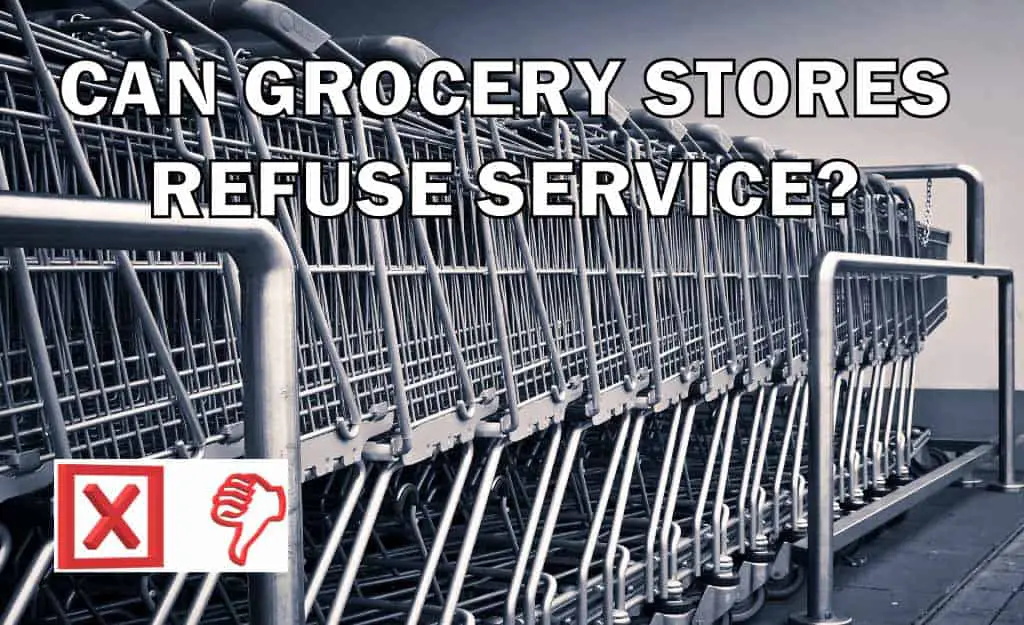Everyone knows that short adage “no shoes, no shirt, no service,” or maybe you have seen the sign outside of some grocery stores that reads “We reserve the right to refuse service to anyone,” but how far can a grocery store go in its right to turn you away?
In short, any grocery store is well within its rights to refuse service for any reason except based on discrimination. Certain classes of citizens are protected under the law, such as those who fall into a certain age bracket or who have a disability, to name just two.
With so many nuanced laws, it can be challenging to decide what counts as discrimination and a grocery store acting well within its rights to refuse service to specific customers. Here is the gist of what you need to know to make a more informed assessment.
Reasons Grocery Stores Can Refuse Service
The biggest reason grocery stores should have the right to refuse service is to maintain customers’ and employees’ safety. If a grocery store decides that it is unsafe to wear no shoes or no shirt, they are within their legal rights to turn you away. The establishment reserves the right to make its own rules.
This rule is the same for masks, a recent topic that points to the complicated nature of discrimination. Whereas before, wearing a mask in a store would have been viewed as a threat, wearing a mask today can help protect other customers from contracting the COVID-19 virus.
Some retailers throughout the United States have uniformly established customs on how to behave and dress in their stores, and masks are now a part of the requirements. Beyond federal or statewide requirements, a private business has the right to decide if you must wear a mask on their property, similar to rules regarding wearing shoes.
There are no laws that specifically address why someone would be given a waiver for not wearing a mask. So while some may feel that the mask mandate is discriminatory, as of now, both state and federal governments have not declared any such laws. This means that stores reserve the right to refuse service to those not wearing a mask.
What Specifically Gives Grocery Stores the Right to Refuse Service
Beyond just a desire to keep customers, employees, and the store itself safe, one might wonder what gives grocery stores the legal power to refuse entrance to anyone who wishes to purchase their goods. The answer is that grocery stores are considered private property, and private property comes with legal protections.
Compare this to when you are out hiking or walking around the neighborhood and spot a no-trespassing sign. That land is owned and maintained by someone else, which gives them the legal right to invite or prevent whomever they want from setting foot on their property.
The same goes for store owners. These businesses are inviting you into their store, and by entering, you sign onto a social contract. This contract applies to most privately owned yet publicly occupied spaces.
If you do not comply with the store’s rules for admittance, either the store owner or someone representing the owner, such as an employee, can legally ask you to leave.
Reasons Grocery Stores Are Not Allowed to Refuse Service
Due to the human tendency to take up prejudices against certain groups of people and the historical injustices faced by certain groups of people throughout history, the law has defined a set of protected classes. This helps to prevent discrimination within privately owned businesses. These laws are otherwise known as federal anti-discrimination laws.
These laws were first enacted under the Civil Rights Act which protects the “full and equal enjoyment of the goods, services, facilities, privileges, advantages, and accommodations of any place of public accommodation, without discrimination or segregation on the ground of race, color, religion, or national origin.”
Under the law, these protected classes cannot be refused service on the following factors alone within the United States:
- Sex
- Age
- Veteran status
- Religious beliefs
- Race or skin color
- Nationality or citizenship status
- Disability, pregnancy, or genetic deformation
A business is not even allowed to open its doors to customers unless the establishment is accessible by wheelchair; this ensures that those with disabilities have equal access to the same goods as non-disabled individuals. Some exemptions apply, such as those for historic buildings, once again showing the nuance of the topic.
Anti-Discrimination Laws in Different States
The above classes are legally protected within all fifty states, but some states like California have additional definitions for those who fall under the protected classes. Here are some of California’s additional considerations:
- Marital status
- Sexual orientation
- Gender identity
- Medical conditions
- AIDS/HIV status
- Political affiliation
- Unconventional dress
In California, a store owner can also ban or prevent from entering those who have restraining orders filed against them either by employees or by someone shopping in the store.
New York also has laws around discrimination against sexual orientation, while other states have more nuanced versions. For example, in Arizona, only some cities ban discrimination on the premise of sexual orientation.
Reasons a Grocery Store Can Ban You From The Premises
Similar to the anti-discrimination laws governing refusal of service, the same rules apply when a grocery store has a right to ban you from ever returning. This is one of the more drastic steps that a grocery store can take when it comes to blocking patrons from entering, and it is usually done due to one of the following reasons:
- Suspected or evidence of shoplifting
- History of troublemaking
If someone repeatedly disrupts the flow of service or puts others at risk, grocery stores are within their right to ban you from ever entering again. The same goes for shoplifting, but note that a grocery store cannot use shoplifting as an excuse to ban you if there is no evidence and if the claim is used as a front for other forms of discrimination.
It is important to note that unless there is a justifiable reason for doing so, such as self-defense or preventing abuse of property, neither the employee nor the customer should physically engage.
What to Do When a Grocery Store Refuses Service
Regardless of why you have been refused service, the best course of action is to deescalate the situation and leave the premises. This way, you will have a stronger case if you feel you have been discriminated against as the owner can use an altercation to make the case that they felt their safety was at risk.
If you feel that you have been discriminated against, it is recommended that you reach out to any of the following entities:
- Attorney general
- A lawyer, personal or otherwise
- Your local government
- Human rights commission
Any of the above options will allow you to get more information on your rights to file a claim against the establishment. The human rights commission in your area will investigate and decide on further action.
Conclusion
Grocery stores can refuse service to you, but as protected under the First Amendment, you have the right to express your opinion about a business publicly. You can leave an online review to warn other customers if you feel that you have experienced discrimination or unfair treatment.
Sources:
https://www.mydoorsign.com/blog/right-to-refuse-service-to-anyone/
https://smallbusiness.chron.com/legal-capacity-contract-62816.html
https://www.cbc.ca/news/canada/saskatchewan/saskatchewan-regina-canadian-tire-1.4227980

